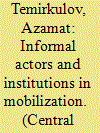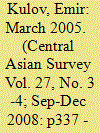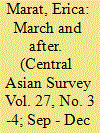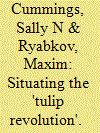|
|
|
Sort Order |
|
|
|
Items / Page
|
|
|
|
|
|
|
| Srl | Item |
| 1 |
ID:
085538


|
|
|
|
|
| Publication |
2008.
|
| Summary/Abstract |
The coloured revolutions, including the Tulip Revolution, have exerted influences on Russian self-representations. At the same time, Russian self-identifications provided the framework within which meaning was attributed to the colour revolutions - they shaped the way in which the 'wave', and the Tulip Revolution within it, was framed. In general, the Tulip Revolution did not have the same resonance in Russian public discourse as the Rose, and in particular, Orange Revolutions, mostly because Ukraine had a place in Russian self-representations that Kyrgyzstan did not. Nevertheless, it crucially enabled a reading of the 'wave' as a wave of disorder and extremism, something that again resonated with Russian self-representations, as it re-confirmed a discourse of 'Russia in danger' that has persisted in Russian self-representations since 1991.
|
|
|
|
|
|
|
|
|
|
|
|
|
|
|
|
| 2 |
ID:
085530


|
|
|
|
|
| Publication |
2008.
|
| Summary/Abstract |
This contribution argues that analysis of the overthrow of President Askar Akaev in Kyrgyzstan in 2005 has tended to overemphasize external factors in the revolution, while underplaying local dynamics, which were complex, difficult to understand, and did not fit with a much simpler narrative of democratic change, inspired by external encouragement. In reality, popular discontent, mobilized by local elites in their support during a highly competitive electoral process, led to elite defection and cross-regional political alliances that severely undermined the Akaev regime. International engagement, and Western-funded NGOs and civil society groups played a much more marginal role than is normally portrayed. For the most part, Western groups engaged with an almost 'virtual' sphere of politics, in which NGOs and democracy groups predominated, but where there was little ability to influence the real world of the Kyrgyz polity.
|
|
|
|
|
|
|
|
|
|
|
|
|
|
|
|
| 3 |
ID:
085533


|
|
|
|
|
| Publication |
2008.
|
| Summary/Abstract |
Mobilization in the south of Kyrgyzstan immediately prior to and during the March events was, it is argued here, a very complex process. Using a framework of incentives, the author illustrates that people were encouraged to protest through a mix of purposive, material and solidarity incentives, and that within this mix, grievances often occupied a secondary place. The following elements are highlighted in the run-up to mobilization in the south: conjuncture; patronage networks based on traditional solidarity (tooganchilik); and pre-existing organizations and institutions, such as the institutions of the aksakal (elder), kurultai (assembly) and palvan (wrestler)
|
|
|
|
|
|
|
|
|
|
|
|
|
|
|
|
| 4 |
ID:
085529


|
|
|
|
|
| Publication |
2008.
|
| Summary/Abstract |
This article suggests that commentators have over-emphasized a 'democratic meaning' behind the 'Tulip Revolution', partly because of a certain misrepresentation of 'transition' in post-1990 Kyrgyzstan. The notion of political competition has been particularly important, a consistent feature of Kyrgyz politics that has suggested a liberalizing tendency in Kyrgyzstan. The nature of contestation, however, is at least partially linked to the traditional societal organization of the Kyrgyz ethnic group, and particularly to its multi-layered division into sub-ethnic groups that are in a state of stable competitive relationship to each other.
|
|
|
|
|
|
|
|
|
|
|
|
|
|
|
|
| 5 |
ID:
085535


|
|
|
|
|
| Publication |
2008.
|
| Summary/Abstract |
Analyzing political opportunity structure in both the long and short terms, this article focuses specifically on the trigger effect of elections that provided the political space for oppositional leaders to frame their grievances. The emerging framework of understanding mobilization in the coloured revolutions combines stolen elections as a motivating trigger; an incumbent weakened by succession crisis and disunity of his power base; the semi-authoritarian character of pre-revolutionary politics; an opposition able to unite despite their inevitable differences and potentially important international factors. The specific mechanisms that translated stolen elections into mass demonstrations, succession crisis into a defeat of the incumbent and foreign example into a spillover effect, are not yet perfectly understood, and nor are their outcomes. The implications of how stolen and manipulated elections differ from each other are explored.
|
|
|
|
|
|
|
|
|
|
|
|
|
|
|
|
| 6 |
ID:
085527


|
|
|
|
|
| Publication |
2008.
|
| Summary/Abstract |
This article recalls the major events that have taken place since 24 March 2005. It examines Bakiev's new government formed in December 2007, analyses the changes in criminal world dynamics, explains problems in the hydro-energy sector, and concludes with a section on civil society groups. The article demonstrates how corruption, crime and politics are interlinked in the country and how, on the other hand, local civil society groups have proved to be considerably more stable compared to political parties.
|
|
|
|
|
|
|
|
|
|
|
|
|
|
|
|
| 7 |
ID:
085532


|
|
|
|
|
| Publication |
2008.
|
| Summary/Abstract |
This contribution applies Easton's concept of political support to an analysis of north and south Kyrgyzstan. Testing alternative theories of geographical distribution of political support, the study seeks to understand the relationship between, on the one hand, political support for the regime and its institutions, and on the other, ethnicity, urbanization and region of residence. It rejects the hypothesis that the north tends to support the opposition and the south supports the president, arguing instead that the north is more pessimistic in general about the state and non-state institutions.
|
|
|
|
|
|
|
|
|
|
|
|
|
|
|
|
| 8 |
ID:
085531


|
|
|
|
|
| Publication |
2008.
|
| Summary/Abstract |
More than a decade of post-Soviet transition has given rise to political-criminal clans in Kyrgyzstan, thus blurring the boundaries between the legitimate sector and the criminal underworld. The Tulip Revolution, which is frequently referred to as an 'anti-crime' and an 'anti-corruption' event, was followed by increasing political violence and more powerful organized crime groups. This article looks at the reasons for these developments. It argues that the involvement of criminal figures in the revolutionary process, the weakness of the political opposition to Akaev's outgoing regime and post-revolutionary uncertainty and chaos were the main factors. After temporary confusion, the incoming elites mobilized resources, revitalized the corruption pyramid schemes and fought back criminal leaders in order to reassert themselves. Following the assassination of two of the most influential underworld leaders in unclear circumstances, the incumbent regime and new ruling family are progressively consolidating their power. So far, however, the increased power of the ruling regime has not strengthened the Kyrgyz state.
|
|
|
|
|
|
|
|
|
|
|
|
|
|
|
|
| 9 |
ID:
085536


|
|
|
|
|
| Publication |
2008.
|
| Summary/Abstract |
This contribution aims to assess the role of external and domestic previously successful examples in influencing the revolution in Kyrgyzstan. While the Rose Revolution in Georgia in 2003 and the Orange Revolution in Ukraine in 2004 are the external examples, Kyrgyzstan's Aksy protests in 2002 constitute a domestic example. The argument seeks neither to undermine other reasons why the 'Tulip Revolution' happened, nor claims to be able to trace precise linkage. Instead, it aims to illustrate that previous domestic example opened up possibilities for the 2005 March events as much or even more than external modular examples.
|
|
|
|
|
|
|
|
|
|
|
|
|
|
|
|
| 10 |
ID:
085528


|
|
|
|
|
| Publication |
2008.
|
| Summary/Abstract |
The authors assess various writings on the 'coloured revolutions' more generally and the 'Tulip Revolution' specifically. They place this scholarship into three broad categories: an assessment of the Akaev years from a democratization and state-building perspective; the nature of and relationship between formal and informal institutions prior to and after March 2005; and, finally, the domestic and international factors behind mobilization. These correspond broadly to the three areas of enquiry by the contributors to this collection.
|
|
|
|
|
|
|
|
|
|
|
|
|
|
|
|
|
|
|
|
|